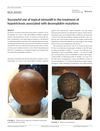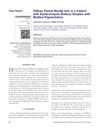 1 citations,
August 2019 in “Pediatric dermatology”
1 citations,
August 2019 in “Pediatric dermatology” Topical minoxidil helped an 8-year-old boy with a genetic hair disorder grow hair.
5 citations,
May 2014 in “Clinical and Experimental Dermatology” Mutations in the desmoplakin gene can cause hair problems and deadly heart disease.
 June 2023 in “British journal of dermatology/British journal of dermatology, Supplement”
June 2023 in “British journal of dermatology/British journal of dermatology, Supplement” A child with skin and tooth symptoms was found to have a genetic mutation causing cardiocutaneous syndrome, leading to heart problems.
 2 citations,
July 2015 in “Archives of Dermatological Research”
2 citations,
July 2015 in “Archives of Dermatological Research” A new gene variant in the DSP gene is linked to a unique type of hair loss.
 59 citations,
June 2008 in “Journal of The American Academy of Dermatology”
59 citations,
June 2008 in “Journal of The American Academy of Dermatology” The article explains the genetic causes and symptoms of various hair disorders and highlights the need for more research to find treatments.

Researchers found a genetic link for hereditary hair loss but need more analysis to identify the exact gene.
 1 citations,
March 2023 in “Frontiers in Cardiovascular Medicine”
1 citations,
March 2023 in “Frontiers in Cardiovascular Medicine” A specific gene variant is linked to heart disease, increased heart muscle, curly hair, and thick skin on palms and soles.
 December 2018 in “IntechOpen eBooks”
December 2018 in “IntechOpen eBooks” Neurohormones help control skin health and could treat skin disorders.
 1 citations,
January 2017 in “Current Dermatology Reports”
1 citations,
January 2017 in “Current Dermatology Reports” Early baldness in men may indicate risks for obesity, metabolic syndrome, insulin resistance, and heart disease, similar to women with PCOS. Alopecia areata is often linked with autoimmune diseases and mental health issues. Certain hair disorders are due to genetic issues, and chemotherapy can cause hair loss through specific biological pathways. Iron deficiency's link to hair loss is still disputed.
 43 citations,
December 2013 in “Seminars in Cell & Developmental Biology”
43 citations,
December 2013 in “Seminars in Cell & Developmental Biology” Genetic mutations can cause hair growth disorders by affecting key genes and signaling pathways.
13 citations,
August 2005 in “Journal of Investigative Dermatology Symposium Proceedings” Mutations in the DSG4 gene cause fragile, sparse hair in humans, mice, and rats.
 9 citations,
January 2015 in “Current problems in dermatology”
9 citations,
January 2015 in “Current problems in dermatology” Scientists have found specific genes linked to different hair loss conditions, which could lead to new treatments.
 3 citations,
September 2005 in “Experimental dermatology”
3 citations,
September 2005 in “Experimental dermatology” The cornified envelope is crucial for skin's barrier function and involves key proteins and genetic factors.
 1 citations,
September 2015 in “Clinics in Dermatology”
1 citations,
September 2015 in “Clinics in Dermatology” The guide helps doctors diagnose hair problems by suggesting a thorough patient history, physical exams, and various diagnostic tools.
 1 citations,
January 2014 in “International Journal of Trichology”
1 citations,
January 2014 in “International Journal of Trichology” A patient with a rare hair condition and skin disorder showed hair improvement after treatment.
67 citations,
June 2019 in “Proceedings of the National Academy of Sciences” A new 3D culture system helps grow and study mouse skin stem cells for a long time.
11 citations,
December 2013 in “Clinical and experimental dermatology” A child with skin and heart issues had rare genetic mutations affecting skin and heart cell cohesion.
 1 citations,
February 2013 in “InTech eBooks”
1 citations,
February 2013 in “InTech eBooks” Genetic mutations cause various hair diseases, and whole genome sequencing may reveal more about these conditions.
 August 2019 in “Journal of Investigative Dermatology”
August 2019 in “Journal of Investigative Dermatology” Frog skin cells need the protein desmoplakin for proper development and cell layer formation.
 41 citations,
November 2011 in “The Journal of Dermatology”
41 citations,
November 2011 in “The Journal of Dermatology” Some hair loss disorders are caused by genetic mutations affecting hair growth.
70 citations,
January 2014 in “International review of cell and molecular biology” Keratin proteins are crucial for healthy skin, but mutations can cause skin disorders with no effective treatments yet.
 39 citations,
January 2015 in “Annals of dermatology/Annals of Dermatology”
39 citations,
January 2015 in “Annals of dermatology/Annals of Dermatology” Three new types of a skin blistering disease were found, caused by specific gene mutations.
 211 citations,
April 2018 in “Cold Spring Harbor Perspectives in Biology”
211 citations,
April 2018 in “Cold Spring Harbor Perspectives in Biology” Keratins are crucial for cell structure, growth, and disease risk.
 54 citations,
November 2015 in “Methods in enzymology on CD-ROM/Methods in enzymology”
54 citations,
November 2015 in “Methods in enzymology on CD-ROM/Methods in enzymology” Keratins are important for skin cell health and their problems can cause diseases.
 24 citations,
October 2014 in “Cold Spring Harbor Perspectives in Medicine”
24 citations,
October 2014 in “Cold Spring Harbor Perspectives in Medicine” Genetic research has advanced our understanding of skin diseases, but complex conditions require an integrative approach for deeper insight.
 21 citations,
November 2009 in “Dermatologic Clinics”
21 citations,
November 2009 in “Dermatologic Clinics” The document suggests that certain protein deficiencies and scalp blistering in Epidermolysis Bullosa may cause hair loss.
 1 citations,
July 2016 in “Elsevier eBooks”
1 citations,
July 2016 in “Elsevier eBooks” Understanding skin structure and development helps diagnose and treat skin disorders.
 August 2019 in “Journal of Investigative Dermatology”
August 2019 in “Journal of Investigative Dermatology” The study found that tight junctions reach the top layer of the skin's stratum granulosum, not just the second top layer as previously thought.
210 citations,
February 2008 in “Nature genetics” Mutations in the P2RY5 gene cause autosomal recessive woolly hair.
1 citations,
July 2021 in “IntechOpen eBooks” Environmental factors can cause mutations in skin proteins, leading to skin disorders.























